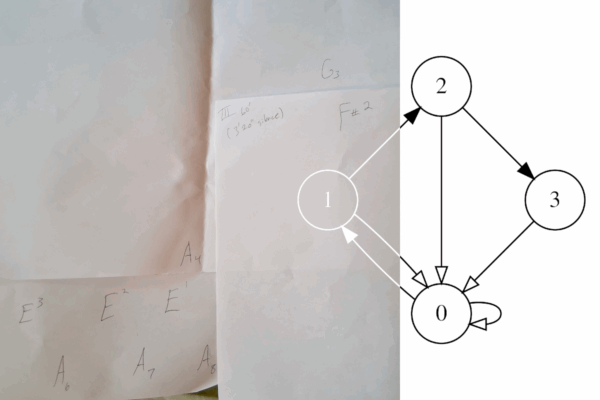
Neal Kosaly-Meyer presents his ongoing work for solo piano, Gradus: For Fux, Tesla and Milo the Wrestler. A large, mixed ensemble will perform John Teske’s novelty generator, a new improvisation framework for durational performance. Both works will be performed simultaneously as a two-hour piano concerto, with the ensemble encircling the piano.
Gradus: for Fux, Tesla and Milo the Wrestler is Neal Kosaly-Meyer’s composition in progress for solo piano. It began with the sentence, “learn to play the piano one note at a time.” That instruction became a project to devote an extended solo improvisation session to each single tone on the piano, and to each combination of tones on the piano. Now in year 24 of the project, all the pitches in the D major scale have been accumulated, and are featured in the first rung of tonight’s performance. Live performances of Gradus are presented as 3 Rungs, one Rung focused on a single pitch, a second Rung on 2 pitches, and the third on 3 or more pitches. The ambient sound of the performance space is fully as important to a Gradus performance as are the intentionally produced piano sound.
Neal Kosaly-Meyer has been actively working on Gradus: for Fux, Tesla and Milo the Wrestler since 2002. Another long-term project has been A Finnegans Wake Project, learning and performing from memory each of the seventeen chapters of James Joyce’s Finnegans Wake. Part II, Chapter 3, will be performed this December at Chapel Performance Space, one of the Wake’s longest chapters, taking approximately five hours to recite. Kosaly-Meyer also performs rock n roll with Karen Eisenbrey as Your Mother Should Know, and is a founding member with Keith Eisenbrey and Aaron Keyt of Banned Rehearsal, an argument in creative expression, now entering its forty-second year.
For more than fifteen years, John Teske has been exploring composition for open instrumentation, shaped by hand-crafted algorithms. His latest work, ‘novelty generator,’ continues this approach. Inspired by elementary cellular automata, the piece is built upon straightforward rules that allow for unexpected and complex patterns to emerge. ‘novelty generator’ will be performed by: Matt Benham, Hanna Broback, Aaron Michael Butler, Haley Freedlund, Noel Kennon, Dave Knott, Christian Pincock, Greg Sinibaldi, Dave Stanford, John Teske, and Evan Woodle.
John Teske is a Seattle-based composer writing contemporary concert music and presenting site-specific performances. He has written works for soloists, chamber ensembles, and chamber orchestras, which have been performed across the Americas and Europe. Teske’s compositional approach balances intentional composition with spontaneous expression. Using algorithmic techniques, he sculpts scores and musical systems that incorporate chance, variation, and improvisation. He experiments with distilling musical concepts to their essence and aims to write music that can be performed by any ensemble of instruments. Teske’s work has been supported by organizations such as the Seattle Office of Arts & Cultural Affairs, the Jack Straw Foundation, and the City of Seattle.
